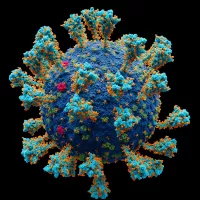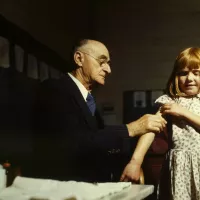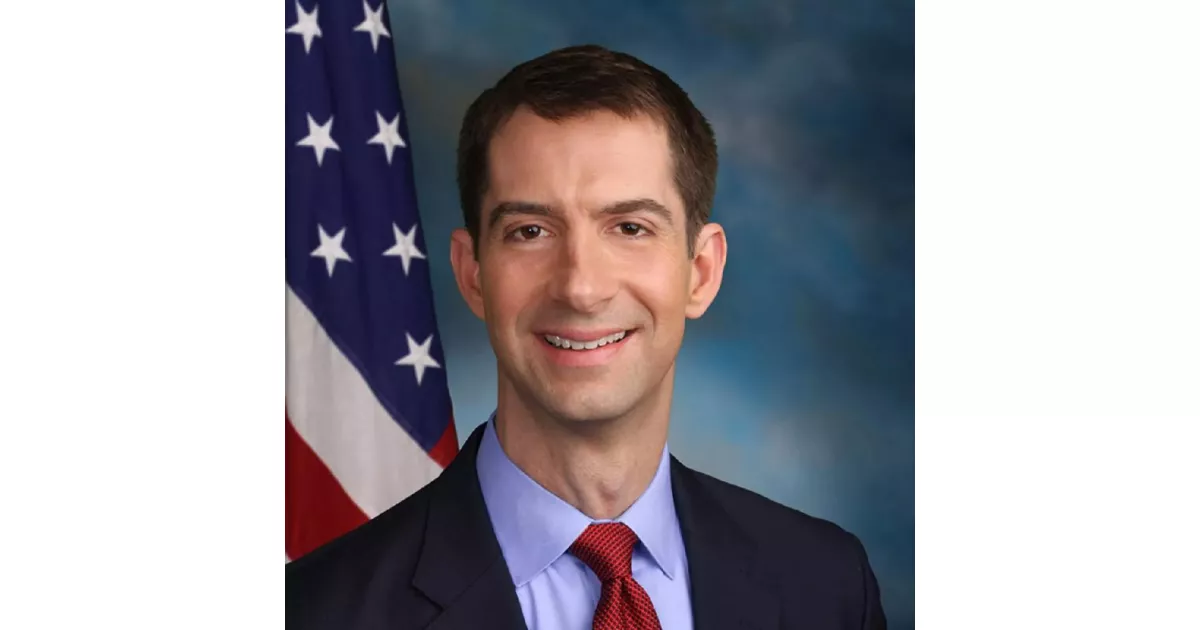Tom Cotton is an American politician and Army veteran currently serving as the junior United States Senator from Arkansas since 2015. A Republican, he holds the position of Chairman of the Senate Republican Conference and is the third-ranking Senate Republican. He also leads the Senate Intelligence Committee, demonstrating his influence and involvement in national security matters.
May 13, 1977: Tom Cotton's Birth
On May 13, 1977, Thomas Bryant Cotton was born. He is an American politician and Army veteran who has been serving as the junior United States senator from Arkansas since 2015.
1979: Reference to Export Administration Act
In July 2017, the Israel Anti-Boycott Act was viewed by some as a clarification of the existing Export Administration Act of 1979.
1981: Reference to Iran's Past
In July 2018, while introducing the Iran Hostage Taking Accountability Act, Tom Cotton stated that Iran had not changed much since 1981.
1993: Jay Dickey Held 4th District Seat
In 1993, Jay Dickey held the 4th district seat.
1995: Accepted to Harvard College
In 1995, Tom Cotton was accepted to Harvard College after graduating from high school. He majored in government and joined the editorial board of The Harvard Crimson.
1998: Clinton's Actions During Bombing of Iraq
In 1998, President Clinton took action during the Bombing of Iraq.
1998: Graduated from Harvard College
In 1998, Tom Cotton graduated from Harvard College with an A.B. magna cum laude after three years of study. His senior thesis focused on The Federalist Papers.
1998: Wrote Article in The Harvard Crimson
In 1998, Tom Cotton wrote an article in "The Harvard Crimson" in which he questioned the internet's value as a teaching tool in the classroom. This article was later criticized in September 2011.
1998: Accepted into Master's Program
In 1998, after graduating from Harvard College, Tom Cotton was accepted into a master's program at Claremont Graduate University.
1999: Enrolled at Harvard Law School
In 1999, Tom Cotton left the master's program at Claremont Graduate University and enrolled at Harvard Law School.
2001: Jay Dickey Left 4th District Seat
In 2001, Jay Dickey left the 4th district seat.
2002: Graduated from Harvard Law School
In 2002, Tom Cotton graduated from Harvard Law School with his Juris Doctor.
January 11, 2005: Enlistment in the United States Army
On January 11, 2005, Tom Cotton enlisted in the United States Army.
March 2005: Entry into Officer Candidate School
In March 2005, Tom Cotton entered Officer Candidate School (OCS) in the U.S. Army.
2005: Cotton Enlists in the U.S. Army
In 2005, after working as a law clerk and in private practice, Tom Cotton enlisted in the U.S. Army.
May 2006: Deployment to Baghdad
In May 2006, Tom Cotton was deployed to Baghdad as part of Operation Iraqi Freedom (OIF) as a platoon leader with the 101st Airborne Division.
June 2006: Open Letter to The New York Times
In June 2006, while stationed in Iraq, Tom Cotton wrote an open letter to the editor of "The New York Times", accusing three journalists of violating "espionage laws" by publishing an article about a classified government program. The letter was published on Power Line, a conservative blog.
December 2006: Promotion and Reassignment
In December 2006, Tom Cotton was promoted to first lieutenant and reassigned to the 3rd U.S. Infantry Regiment (The Old Guard) at Fort Myer in Arlington, Virginia, as a platoon leader.
October 2008: Deployment to Afghanistan
In October 2008, Tom Cotton was deployed to eastern Afghanistan as the operations officer of a Provincial Reconstruction Team (PRT).
July 2009: End of Afghanistan Deployment
In July 2009, Tom Cotton's deployment to eastern Afghanistan concluded.
September 2009: Honorable Discharge from the Army
In September 2009, Tom Cotton was honorably discharged from the U.S. Army after completing two combat deployments overseas.
July 2010: Enters Army Reserve
In July 2010, Cotton entered the Army Reserve (USAR).
2010: Beth Anne Rankin Nominee
In 2010, Beth Anne Rankin was the Republican nominee for Congress.
2010: Considered Run Against Blanche Lincoln
In 2010, Tom Cotton considered a run against incumbent Democratic U.S. senator Blanche Lincoln but declined due to lack of donors and believing it was premature.
September 2011: Criticism for 1998 Article
In September 2011, Arkansas Times editor Max Brantley criticized Tom Cotton for a 1998 article he wrote in "The Harvard Crimson" questioning the internet's value as a teaching tool.
2011: False Claims in Campaign Ads
From 2011, Tom Cotton falsely claimed in campaign ads and videos that he had served in Iraq and Afghanistan and earned a Bronze Star as a U.S. Army Ranger, even though he did not serve in the Army's 75th Ranger Regiment. Salon reported this in 2021.
2011: Rosen's Argument on Espionage Act
In 2011, Jay Rosen, a professor of journalism at New York University, argued that accusing investigative journalists of engaging in espionage is an extreme culture war tactic, in response to Cotton's open letter to The New York Times.
2011: Ran for Congress
In 2011, Tom Cotton ran for Congress in Arkansas's 4th congressional district after Democratic incumbent Mike Ross announced he would not seek reelection.
February 2012: Marcus Richmond Dropped Out of Race
In February 2012, Marcus Richmond dropped out of the race for Congress in Arkansas's 4th congressional district.
2012: Support for Traditional Marriage
In 2012, Tom Cotton stated his support for the "traditional understanding of marriage as the union of one man and one woman" and the Defense of Marriage Act.
2012: Opposition to Affordable Care Act
In 2012, Tom Cotton voiced his opposition to the Affordable Care Act, stating that "the first step is to repeal that law, which is offensive to a free society and a free people".
2012: Opposition to Amnesty for Illegal Aliens
In 2012, Tom Cotton's campaign website stated his opposition to granting illegal aliens amnesty or a so-called 'earned path to citizenship'.
January 3, 2013: Sworn into the House of Representatives
On January 3, 2013, Tom Cotton was sworn into the House of Representatives by Speaker John Boehner.
February 2013: Voted to Eliminate Pay Adjustment
In February 2013, Tom Cotton voted for an act to eliminate the 2013 statutory pay adjustment for federal employees.
May 2013: Discharge from Army Reserve
In May 2013, Cotton was discharged from the Army Reserve.
June 2013: Voted in favor of the Pain-Capable Unborn Child Protection Act
In June 2013, Tom Cotton voted in favor of the Pain-Capable Unborn Child Protection Act, a bill aimed at banning abortion after 20 or more weeks post-fertilization.
July 2013: Opposition to Immigration Reform Proposal
In July 2013, Tom Cotton spoke against the Border Security, Economic Opportunity, and Immigration Modernization Act of 2013 during a House Republican meeting. His opposition contributed to the House's decision not to consider the bill.
August 6, 2013: Announced Senate Challenge
On August 6, 2013, Tom Cotton announced he would challenge Democratic incumbent Mark Pryor for his seat in the United States Senate.
August 2013: Voted against the Bipartisan Student Loan Certainty Act of 2013
In August 2013, Tom Cotton voted against the Bipartisan Student Loan Certainty Act of 2013, preferring an alternative that would end the "federal-government monopoly on the student-lending business".
2013: Cotton Served in the House of Representatives
In 2013, Tom Cotton began serving in the United States House of Representatives, representing Arkansas's 4th congressional district.
2013: Introduction and Withdrawal of Legislative Language on Iran Sanctions
In 2013, Tom Cotton introduced legislative language to prohibit trade with relatives of individuals subject to U.S. sanctions against Iran, but he withdrew it after criticism regarding its constitutionality.
2013: Vote Against Reauthorizing Violence Against Women Act
In 2013, Tom Cotton voted against reauthorizing the Violence Against Women Act, citing concerns that the federal powers in the act were too broad.
2013: Reference to Durbin Misquotation
In January 2018, regarding alleged comments made by President Trump, Slate magazine asserted that Tom Cotton was referring to a misquotation Dick Durbin made of a 2013 gathering at the Obama White House at which Durbin was not present.
2014: Marriage to Anna Peckham
In 2014, Tom Cotton married attorney Anna Peckham.
2014: Endorsement from the NRA
In 2014, Tom Cotton received an A rating and endorsement from the National Rifle Association of America (NRA).
2014: Voted against the Agricultural Act
In 2014, Tom Cotton voted against the revised measure, the Agricultural Act, which expanded crop insurance and a price floor for rice farmers.
2014: Cotton Elected to the Senate
In 2014, Tom Cotton was elected to the Senate, defeating two-term Democratic incumbent Mark Pryor.
2014: Continued False Claims in Campaign Ads
Until 2014, Tom Cotton falsely claimed in campaign ads and videos that he had served in Iraq and Afghanistan and earned a Bronze Star as a U.S. Army Ranger, even though he did not serve in the Army's 75th Ranger Regiment. Salon reported this in 2021.
January 6, 2015: Sworn into Office
On January 6, 2015, Tom Cotton was sworn into office as a U.S. Senator.
February 5, 2015: Called for housing more prisoners at Guantanamo Bay
During a Senate Armed Services Committee hearing on February 5, 2015, Tom Cotton advocated for housing more prisoners at Guantanamo Bay instead of closing the facility.
February 2015: Blocking of Cassandra Butts's Nomination
In February 2015, Tom Cotton blocked the nomination of Cassandra Butts, nominated to be the United States ambassador to the Bahamas, along with ambassador nominees to Sweden and Norway, over a Secret Service leak, though the leak was unrelated to the nominees. He later released his holds on the Sweden and Norway nominees but maintained the hold on Butts.
March 2015: Letter to Iranian Leaders
In March 2015, Tom Cotton wrote and sent a letter to the leaders of the Islamic Republic of Iran, signed by 47 of the Senate's 54 Republicans, that cast doubt on the Obama administration's authority to engage in nuclear-proliferation negotiations with Iran. This action led to questions about a potential violation of the Logan Act.
July 21, 2015: Claimed Secret Side Agreements
On July 21, 2015, Tom Cotton and Mike Pompeo claimed to have uncovered the existence of secret side agreements between Iran and the International Atomic Energy Agency (IAEA) on procedures for inspection and verification of Iran's nuclear activities under the JCPOA.
2015: Tom Cotton Becomes Senator
In 2015, Tom Cotton began his service as the junior United States Senator from Arkansas.
2015: End of House of Representatives Service
In 2015, Tom Cotton concluded his service in the United States House of Representatives.
March 2016: Refusal to Consider Obama's Supreme Court Nominee
In March 2016, Tom Cotton refused to consider Obama's Supreme Court nominee during a presidential election year, arguing that voters should have a chance to weigh in on the makeup of the Supreme Court.
May 26, 2016: Death of Cassandra Butts
On May 26, 2016, Cassandra Butts, whose nomination as United States ambassador to the Bahamas was blocked by Tom Cotton, died while still awaiting a Senate vote.
September 2016: Signed a letter to United States secretary of state John Kerry advocating that the United States use "all available tools to dissuade Russia from continuing its airstrikes in Syria"
In September 2016, Tom Cotton was among 34 senators who signed a letter to United States secretary of state John Kerry advocating that the United States use all available tools to dissuade Russia from continuing its airstrikes in Syria from an Iranian airbase near Hamadan.
2016: Views on Incarceration Rates
In 2016, Tom Cotton rejected the idea that there is over-incarceration in the United States, arguing that law enforcement is only able to identify perpetrators for a minority of crimes and that reduced sentencing would destabilize the country.
2016: Opposed an amendment to the 2016 Defense Authorization Act that would impair any future president's ability to authorize torture
In 2016, Tom Cotton was one of 21 Senate Republicans to oppose an amendment to the 2016 Defense Authorization Act that would impair any future president's ability to authorize torture.
2016: Previous Record in Alaska
In 2016, a record was set in Alaska for a Libertarian candidate in a U.S. Senate election.
2016: Views on Waterboarding and Torture
In 2016, shortly after the presidential election, Tom Cotton denied that waterboarding is a form of torture in a CNN interview. He suggested that allowing it was a "tough call" then-candidate Trump was ready to make.
2016: Response to United Nations Human Rights Council resolutions
In July 2017, some viewed the Israel Anti-Boycott Act as a response to the 2016 United Nations Human Rights Council resolutions that called on corporations to reassess business activities that may impact Palestinian human rights.
February 7, 2017: Proposal of the RAISE Act
On February 7, 2017, Tom Cotton and Senator David Perdue proposed the RAISE Act, an immigration bill that would limit the family route, or chain migration, set a limit on the number of refugees offered residency at 50,000 a year, and remove the Diversity Immigrant Visa.
July 2017: Co-sponsorship of Israel Anti-Boycott Act
In July 2017, Tom Cotton co-sponsored the bipartisan Israel Anti-Boycott Act (S.270), which amended federal law to prohibit support to foreign governments or organizations boycotting Israel, generating controversy over potential restrictions on private citizens' activities.
July 2017: Voted in favor of the Countering America's Adversaries Through Sanctions Act
In July 2017, Tom Cotton voted in favor of the Countering America's Adversaries Through Sanctions Act, which included sanctions against Russia, Iran, and North Korea.
November 2017: Characterized as a Trump loyalist
In November 2017, during Trump's presidency, Tom Cotton was characterized as a Trump loyalist. He frequently met with Trump's staff during the transition period, and according to Steve Bannon, suggested John F. Kelly as U.S. Secretary of Homeland Security.
2017: Support for Trump's Executive Order on Immigration
In 2017, Tom Cotton supported Trump's Executive Order 13769, which prohibited immigration from seven predominantly Muslim countries.
2017: Response to the Las Vegas Shooting
In 2017, in response to the Las Vegas shooting, Tom Cotton initially stated that he did not believe any new gun control legislation would have prevented the shooting. After it was established that semi-automatic rifles with a bump stock attachment were used, he said he was "willing to entertain" regulation of bump stocks.
January 11, 2018: Alleged Comments by Trump at Meeting
On January 11, 2018, Tom Cotton was present at a meeting where Trump allegedly called Haiti and African nations "shithole countries." Cotton and Senator David Perdue issued a joint statement saying they did not recall Trump saying those comments specifically.
January 2018: Protests at Washington Office
In January 2018, five demonstrators were arrested for obstructing Tom Cotton's Washington office while protesting his position on Deferred Action for Childhood Arrivals. They were later released after paying a fine.
March 13, 2018: Comments on Sergei Skripal Poisoning
On March 13, 2018, Tom Cotton commented on the poisoning of Sergei Skripal, predicting that Russian officials would "lie and deny" and suggesting retaliatory measures, including renewed sanctions on oil.
July 2018: Introduction of Iran Hostage Taking Accountability Act
In July 2018, Tom Cotton introduced the Iran Hostage Taking Accountability Act, which would call for the president to compose a list of Iranians responsible for the politically-motivated harassment, abuse, or imprisonment of Americans and impose sanctions on them and their families.
August 2018: Urged the Trump administration to impose sanctions under the Global Magnitsky Act against Chinese officials
In August 2018, Tom Cotton and other lawmakers urged the Trump administration to impose sanctions under the Global Magnitsky Act against Chinese officials responsible for human rights violations against Uyghurs in Xinjiang.
November 2018: Opposition to Criminal Justice Reform Bill
In November 2018, Tom Cotton argued against a bipartisan criminal justice reform bill (FIRST STEP Act), incorrectly claiming that there had been no hearings on the bill. He also asserted that convicts of certain sex-related crimes could accrue credits making them eligible for supervised release.
November 28, 2018: House Passes Bill Adding Ireland to E-3 Visa Program
On November 28, 2018, the House of Representatives passed a bill to add Ireland to the E-3 Non-immigrant Visa Program.
November 28, 2018: House Passage of Ireland E-3 Visa Bill
On November 28, 2018, the House of Representatives passed a bipartisan bill to add Ireland to the E-3 Non-immigrant Visa Program.
December 2018: Senatorial Hold on H.R.7164
In December 2018, Tom Cotton placed a senatorial hold on H.R.7164 – A Bill to add Ireland to the E-3 Non-immigrant Visa Program, preventing it from reaching the Senate floor for consideration.
December 2018: Expressed concern about the withdrawal of American troops in Syria
In December 2018, Tom Cotton was one of six senators to sign a letter expressing concern about Trump's announcement of the withdrawal of American troops in Syria.
December 18, 2018: Vote Against the FIRST STEP Act
On December 18, 2018, Tom Cotton voted against the FIRST STEP Act, a bipartisan criminal justice reform bill, which passed 87-12.
2018: Death Threats
In 2018, Adam Albrett of Fairfax County, Virginia, was arrested for "faxing death threats" against President Donald Trump and members of Congress, including Tom Cotton.
2018: Asserted that the Open Skies agreement was outdated and favored Russian interests
In 2018, Tom Cotton asserted that the Open Skies agreement was outdated and favored Russian interests.
2018: Cosponsored the Countering the Chinese Government and Communist Party's Political Influence Operations Act
In 2018, Tom Cotton cosponsored the Countering the Chinese Government and Communist Party's Political Influence Operations Act, aimed at examining Chinese influence attempts in the U.S. and allied countries.
January 2019: Voted to advance legislation intended to block Trump's intent to lift sanctions against three Russian companies
In January 2019, Tom Cotton was one of 11 Republican senators to vote to advance legislation intended to block Trump's intent to lift sanctions against three Russian companies.
January 2019: Cosponsorship of Constitutional Concealed Carry Reciprocity Act
In January 2019, Tom Cotton was one of 31 Republican senators to cosponsor the Constitutional Concealed Carry Reciprocity Act, a bill that would grant individuals with concealed carry privileges the right to exercise this right in any other state with concealed carry laws.
February 2019: Signed a letter requesting that Pelosi invite President of Taiwan Tsai Ing-wen to address a joint meeting of Congress
In February 2019, Tom Cotton was among a group of Senate Republicans who signed a letter requesting that Speaker of the House Nancy Pelosi invite President of Taiwan Tsai Ing-wen to address a joint meeting of Congress.
April 2019: Calling Southern Poverty Law Center a "political hate group"
In April 2019, Tom Cotton called the Southern Poverty Law Center a "political hate group" and asked the IRS to check whether it should retain its tax-exempt status.
May 2019: Commented on the impact of tariffs on farmers in Arkansas
In May 2019, Tom Cotton commented that there would be "some sacrifices" from Americans due to tariffs, but farmers were willing to make those sacrifices to fend off Chinese attempts to displace the U.S. globally.
May 2019: Cosponsored the South China Sea and East China Sea Sanctions Act
In May 2019, Tom Cotton cosponsored the South China Sea and East China Sea Sanctions Act, intended to disrupt China's consolidation or expansion of its claims in disputed zones in the South China Sea.
May 2019: Statements on Potential War with Iran
In May 2019, Tom Cotton stated that in the event of a war with Iran, the United States could easily win in "two strikes" and warned of a "furious response" to any provocation from Iran.
July 2019: Sponsored the Defending America's 5G Future Act
In July 2019, Tom Cotton and Senator Chris Van Hollen sponsored the Defending America's 5G Future Act, aimed at preventing Huawei from being removed from the Commerce Department's "entity list" without congressional approval.
August 2019: Suggested the U.S. should buy Greenland
In August 2019, it was reported that Tom Cotton had suggested to Trump and the Danish ambassador that the U.S. should buy Greenland.
October 2019: Terroristic Threatening Charge
In October 2019, James Powell, a 43-year-old Arkansas resident, was charged with "first-degree terroristic threatening" after an investigation by U.S. Capitol Police and the FBI for threatening Senator Tom Cotton and Representative Rick Crawford.
2019: Publication of Book on the Old Guard
In 2019, Tom Cotton published a book about the role of the Old Guard at Arlington National Cemetery, based partly on his service in that unit as an officer.
January 2020: Goodloe Sentenced for Threatening Letter
In January 2020, Henry Edward Goodloe was sentenced to two years' probation for sending Tom Cotton a threatening letter and a package containing white powder.
January 28, 2020: Urged the Trump administration to halt commercial flights from China to the United States
On January 28, 2020, Tom Cotton urged the Trump administration to halt commercial flights from China to the United States due to the emergence of COVID-19.
February 16, 2020: Suggested the coronavirus may have started at the biosafety level 4 super laboratory in Wuhan, China
In a February 16, 2020, Fox News interview, Tom Cotton suggested the coronavirus may have originated at the biosafety level 4 super laboratory in Wuhan, China, prompting responses from scientists and media outlets.
March 2020: Tweeted about holding accountable those who inflicted the pandemic on the world
Around March 2020, Tom Cotton tweeted about holding accountable those who inflicted the pandemic on the world, responding "Correct" to a tweet stating "China will pay for this".
April 2020: Suggested restrictions on Chinese students studying in the U.S.
In April 2020, Tom Cotton suggested that Chinese students in the United States should be restricted to studying humanities and banned from science-related fields.
April 2020: Accused the Chinese government of a deliberate attack on the world through non-containment of the pandemic
In late April 2020, Tom Cotton stated in a Fox News interview that the non-containment of the pandemic was a "deliberate" and "malevolent" attack by the Chinese government on the rest of the world.
July 2020: Introduction of Saving American History Act
In July 2020, Tom Cotton introduced the Saving American History Act of 2020, proposed legislation preventing the use of federal tax dollars for the teaching of The 1619 Project. He also described slavery as a "necessary evil" upon which the union was built.
August 10, 2020: Sanctioned by the Chinese government
On August 10, 2020, the Chinese government sanctioned Tom Cotton and 10 other Americans for "behaving badly on Hong Kong-related issues".
September 2020: Shortlisted for Supreme Court Nominee
In September 2020, Tom Cotton was shortlisted by Trump as a potential Supreme Court nominee, but Amy Coney Barrett was ultimately chosen instead.
2020: Tom Cotton on the 2020 Presidential Election
In January 2021, Tom Cotton announced he would not support any attempts to overturn the 2020 United States presidential election during the joint congressional certification of Electoral College results on January 6, 2021.
January 6, 2021: Refusal to Support Overturning 2020 Election
On January 6, 2021, Tom Cotton announced that he would not support any attempts to overturn the 2020 United States presidential election during the joint congressional certification of Electoral College results.
January 2021: Announcement Against Overturning 2020 Election
In January 2021, Tom Cotton announced he would not support any attempts to overturn the 2020 United States presidential election during the joint congressional certification of Electoral College results on January 6, 2021.
February 2021: Criticism of Biden's Immigration Policies at CPAC
In February 2021, Tom Cotton criticized the Democrats' and Joe Biden's immigration policies at CPAC. He claimed that the Biden administration had halted deportations for all illegal aliens, including criminals, a claim PolitiFact rated as "False".
May 28, 2021: Voted against creating an independent commission to investigate the 2021 United States Capitol attack
On May 28, 2021, Tom Cotton voted against the creation of an independent commission that would investigate the events surrounding the 2021 United States Capitol attack.
September 2021: Rejection of Amendment on Afghan Refugee Assistance
In September 2021, the Senate voted along partisan lines to reject Tom Cotton's amendment that sought to curtail assistance to Afghan refugees and hinder their ability to obtain federally recognized identification cards without proving their identity.
2021: Salon Reports False Claims
In 2021, Salon reported that Tom Cotton falsely claimed in campaign ads and videos from 2011 to 2014 that he had served in Iraq and Afghanistan and earned a Bronze Star as a U.S. Army Ranger, even though he did not serve in the Army's 75th Ranger Regiment. Snopes rated Salon's reporting as true.
May 2022: Listed as one of the U.S. lawmakers who had received the most funding from the NRA.
In May 2022, People.com listed Tom Cotton as one of the U.S. lawmakers who had received the most funding from the NRA.
June 2022: Introduction of the "Stop Gun Criminals Act"
In June 2022, Tom Cotton introduced the "Stop Gun Criminals Act", which sought to increase minimum sentences for existing offenses but provided no new regulation.
June 2022: Reacted to Overturning of Roe v. Wade
In June 2022, after Roe v. Wade was overturned, Tom Cotton described Roe as a "tragic mistake" that had been "corrected" and praised those who worked towards this outcome.
2022: Blasted the ranked-choice voting system
In 2022, following Mary Peltola's victory in the Alaska's at-large congressional district special election, Tom Cotton criticized the ranked-choice voting system used in Alaska.
March 2023: Introduced the Not One More Inch or Acre Act
In March 2023, Tom Cotton and Senator Katie Britt introduced the Not One More Inch or Acre Act, which aimed to ban Chinese nationals or entities from owning American land.
July 2023: Criticized President Joe Biden's efforts to diplomatically engage with China
In July 2023, Tom Cotton criticized President Joe Biden's diplomatic efforts with China, comparing Biden administration officials to "lovestruck teenagers."
October 2023: Condemnation of Hamas and Support for Israel
In October 2023, Tom Cotton condemned Hamas's actions during the Israel–Hamas war, expressed support for Israel's right to self-defense, and denied that Israel was committing war crimes in the Gaza Strip, asserting Israel's right to strike back if Hamas used civilian infrastructure for military purposes.
2023: Voted against final passage of the Fiscal Responsibility Act of 2023
In 2023, Tom Cotton was among the Senate Republicans who voted against the Fiscal Responsibility Act of 2023, expressing concerns about the bill's limitations on defense spending increases.
2023: Response to COVID-19 Lab Leak Assessment
In early 2023, after the United States Department of Energy assessed that a lab leak was to blame for the emergence of COVID-19, Tom Cotton responded by stating that holding the Chinese Communist Party accountable was more important than being proven right.
January 2024: Questioned TikTok CEO Shou Zi Chew during a Senate hearing
In January 2024, during a Senate hearing on child safety on social media, Tom Cotton repeatedly questioned TikTok CEO Shou Zi Chew about his potential membership in the Chinese Communist Party.
February 28, 2024: Response to Aaron Bushnell's Self-Immolation
On February 28, 2024, Tom Cotton responded to United States airman Aaron Bushnell's self-immolation by sending a letter to Defense Secretary Lloyd Austin calling Bushnell's death "an act of horrific violence" that was "in support of a terrorist group [Hamas]" and asking about internal efforts to address extremism in the military.
April 2024: Threats against the International Criminal Court
In April 2024, Tom Cotton threatened to cut U.S. funding to the International Criminal Court (ICC), sanction ICC employees, and bar the employees and their families from entering the U.S. if the ICC issues arrest warrants for Benjamin Netanyahu and other Israeli officials.
November 2024: Selection as Senate Republican Conference Chair
In November 2024, Tom Cotton was selected as chair of the Senate Republican Conference and chair of the Senate Intelligence Committee. He was also considered a potential candidate for United States Secretary of Defense in Donald Trump's second cabinet.
November 21, 2024: Response to ICC Arrest Warrants
On November 21, 2024, after the ICC issued arrest warrants for Netanyahu and Yoav Gallant, Tom Cotton called it a "kangaroo court" and the prosecutor, Karim Khan, a "deranged fanatic," also suggesting that The Hague should be invaded if Netanyahu was arrested.
February 2025: Criticized Elon Musk in his book, Seven Things You Can't Say About China
In February 2025, Tom Cotton criticized Elon Musk for "chasing Chinese dollars" in his book, Seven Things You Can't Say About China.
Mentioned in this timeline
Huawei is a Chinese multinational technology corporation headquartered in Shenzhen...
TikTok also known as Douyin in China is a social...
The Affordable Care Act ACA also known as Obamacare is...

The White House located at Pennsylvania Avenue NW in Washington...

Amy Coney Barrett is an American lawyer and jurist who...

Coronaviruses are a family of RNA viruses affecting mammals and...
Trending

26 minutes ago CDC Panel to Discuss COVID-19 Vaccine Injuries Following RFK Jr.'s Meeting

27 minutes ago Casey Means' Surgeon General Nomination Faces Scrutiny Over Mainstream Medicine Criticism and Birth Control Views.
1 hour ago Punch, the lonely baby monkey, goes viral and wins hearts worldwide.

2 hours ago Jon Hamm Discovers Viral Dancing Meme; Reacts to Meme-Worthy Status at 54.

2 hours ago Georgia: Missing child found safe after Amber Alert issued in Barrow County.

3 hours ago Selena Gomez Defends Benny Blanco Amid Dirty Feet Frenzy and Divorce Comments.
Popular

Jesse Jackson is an American civil rights activist politician and...

Barack Obama the th U S President - was the...

Susan Rice is an American diplomat and public official prominent...

XXXTentacion born Jahseh Dwayne Ricardo Onfroy was a controversial yet...

Michael Joseph Jackson the King of Pop was a highly...

Kashyap Pramod Patel is an American lawyer who became the...

